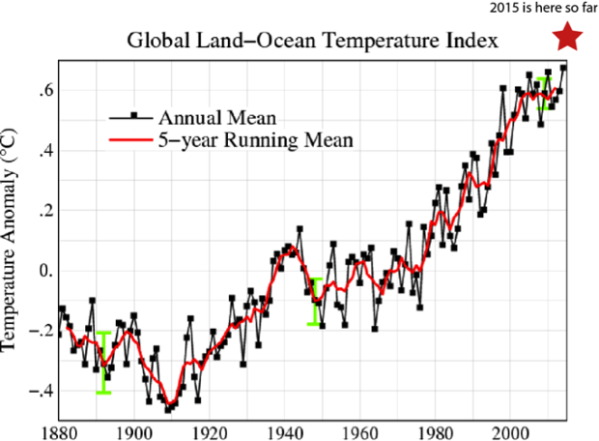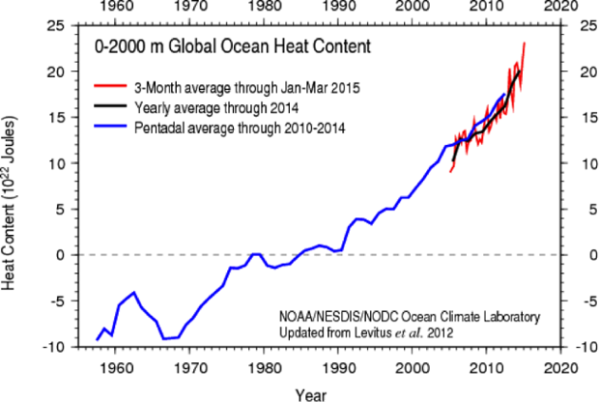Pause?
What a Joke. The Reality is Global Temperatures are Skyrocketing.
15
June, 2015
News
out from NASA today — the
first five months of 2015 are the hottest ever recorded in the global
climate record.
Global temperatures hotter than any comparable period by a very
significant margin.
According
to NASA’s
GISS division,
May of 2015 came in at 0.71 C hotter than the 20th Century average.
That ties 2012 for the second hottest May since record keeping began
in 1880. But, more importantly, when averaged — January (+0.75 C),
February (+0.82 C), March (+0.84 C), April (+0.71 C) and now May —
the first five months of 2015 come in at 0.766 C above 20th Century
baselines. That’s about 0.96 C above 1880s values — a level fast
approaching the 1 C threshold and the far more dangerous climate
impacts that come after.
(NASA
GISS Graph with
modification [star] provided to emphasize global warming extremes for
first five months of 2015. See
also here.)
If
2015 were to remain at such hot levels, the final measure would
appear as the star on the above chart. And with the first half of
June already seeing +0.7 to +0.85 C warmer than 20th Century
conditions amidst a growing El Nino in the Equatorial Pacific, it
appears highly possible, even likely, that current atmospheric
warming levels could be maintained or even exceeded through end of
year.
NOAA
Shows Warming Kept Pace or Accelerated — Climate Change Deniers
Proven Wrong for the 1 Millionth Time
For
reference, +0.76 C is fully 0.15 C hotter than the Super El Nino year
of 1998 — the cherry of all cherries for global warming deniers. A
fossil fueled group that has used this particular atmospheric and
ocean cherry as a basis for arguing that greenhouse gas forced global
warming ‘paused’ after the 1998 El Nino. A claim that has also
been used as a platform to advance a raft of other nonsense including
the false notion that climate sensitivity is far less than consensus
ranges of 3 C ECS and 6 C ESS (basically meaning that each doubling
of atmospheric CO2 brings 3 C warming short term and 6 C warming over
many centuries). A
claim that was recently also destroyed in a fantastic paper released
earlier this month by NOAA.
From
the press release to the June 4 NOAA paper:
A new study published online today in the journal Science finds that the rate of global warming during the last 15 years has been as fast as or faster than that seen during the latter half of the 20th Century. The study refutes the notion that there has been a slowdown or “hiatus” in the rate of global warming in recent years.
There
were numerous related and predictable meltdowns from climate change
denial media and political personalities not worth specific notice at
this time (AW and BT, I have something for you later this year, but
not now.). But the NOAA data is pretty amazingly clear as seen in the
chart below which notably does not include the new 2015 records:
(NOAA
study finds
pace of global warming has kept steady or even accelerated over the
past 35 years.)
Ocean
Heat Accumulation Accelerating
Of
course, any rational observer paying attention to heat accumulation
in the top 2000 meters of the world ocean or the ever more rapidly
destabilizing glaciers in Greenland and Antarctica already knew that
talk of hiatus was probably most likely at best a sick joke. The
ocean ends up taking in a far greater portion of the greenhouse gas
heat forcing than the atmosphere ever could. As a result, more than
93.4 percent of the heat accumulated by human fossil fuel emissions
ends up in the ocean. That’s an enormous amount of heat destined to
come back and impact both glaciers and atmosphere even if rates of
warming in either of those smaller systems had paused (which
NOAA indicates they haven’t).
(Global
Ocean heat content since 1958 as provided by NOAA
NODC showing
an extraordinary heat accumulation and a disturbing upward curve at
the end of the graph.)
Instead,
we see a clearly accelerating rate of ocean warming. A slope that
makes one of those sick upward curves we’ve become so used to when
dealing with a human-spurred greenhouse gas accumulation at least 6
times faster than at any time in all of Earth’s deep history.
It
thus now appears that the atmosphere is in the process of catching up
to the ocean. And the strong heat bleed off a ramping El Nino in the
Pacific now combines with human greenhouse gasses in the range of 400
ppm CO2 and 480 ppm CO2e to enable this ominous heat increase.
Links:






No comments:
Post a Comment
Note: only a member of this blog may post a comment.